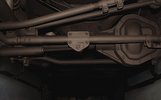
Rustproofing Isn’t Just for Rust
, by Mia Beewen, 2 min reading time

, by Mia Beewen, 2 min reading time
Many believe aluminum or plastic cars don’t need rustproofing—but corrosion affects more than steel. Road brines and harsh chemicals also attack aluminum, plastics, and rubber. Learn how NHOU® rustproofing offers proven protection for every material on your vehicle.
We hear it all the time: “Get a car made of aluminum or plastic and you’ll never worry about rust.” It’s a catchy sales line—but it leaves out an important truth. While rust technically refers to iron or steel, other materials on your vehicle can still corrode, degrade, and fail in very similar (and costly) ways.
Rust is the reddish oxidation of iron and steel. Corrosion is the broader chemical breakdown of a solid— including metals like aluminum—when exposed to water, oxygen, salts, and other chemicals. Different words, same painful outcome: weakened panels, sharp edges, and parts that eventually fall apart.
Aluminum body panels and components are vulnerable to pitting and galvanic corrosion. Left unchecked, corrosion can create holes and structural weaknesses just like rust on steel. So even if your vehicle has a lot of aluminum, it still needs protection.
Modern road de-icers—especially liquid salt brines and magnesium chloride—don’t just attack metal. They can degrade plastics, rubber seals, and wiring insulation, accelerating wear and causing expensive electrical and sealing issues.
The most effective strategy is preventive rustproofing with an environmentally friendly, creeping protective film. Applied correctly, it:
Multiple studies and decades of real-world use point to the same conclusion: proactive application of a high-quality, lab-tested formula provides the best long-term protection. In New Hampshire this formulation is known as NHOU®. While names and blends vary by region, the science is consistent: protect first, and keep protecting.
NHOU® formulations are continually reviewed and refined by chemists to keep pace with evolving road chemicals and winter maintenance practices. That ongoing improvement is a big reason the treatment remains so effective year after year.
Bottom line: Whether the correct term is rust, corrosion, degradation, or decay—your vehicle doesn’t care what we call it. It needs protection either way.
NHOU® is available from The Rust Stop Pro in Chichester, NH. They work closely with chemists to ensure the formula keeps up with changing conditions, so your vehicle gets the best possible protection.